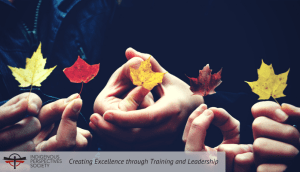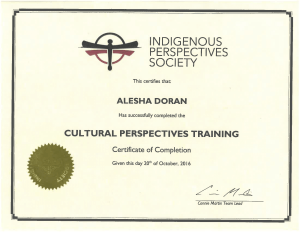 Even though I thought I already had a good understanding of our collective history from university studies, Indigenous friends, living and working with First Nations, life experiences and relationships, my knowledge was assembled in pieces over time. Sitting down for a full day of in-class focused study in Cultural Perspectives Training (CPT) to review our history of colonization really synthesized that knowledge, filled in some important gaps, and deepened my emotional connection the importance of acknowledging our past and the need for each one of us to take action to reconcile.
Even though I thought I already had a good understanding of our collective history from university studies, Indigenous friends, living and working with First Nations, life experiences and relationships, my knowledge was assembled in pieces over time. Sitting down for a full day of in-class focused study in Cultural Perspectives Training (CPT) to review our history of colonization really synthesized that knowledge, filled in some important gaps, and deepened my emotional connection the importance of acknowledging our past and the need for each one of us to take action to reconcile.
Here are 3 valuable perspectives that I (re)learned in CPT:
1. The importance of cultural location. Where we come from builds the foundation of who we are and how we think. By locating ourselves in relationship to one another, we can have a better understanding of what we bring our relationships. In many Indigenous cultures, introductions include family and geography. This is important because it links us to our place in our natural ecology. For example, here is my introduction, “My name is Alesha Doran. My mother is Aleta Leopas and my father is David Hayes. My parents settled in Canada in 1974, coming from Northern California. My ancestors are primarily from Scotland, Sweden, England, and Estonia.” Being open and honest about how you arrived where you are, not only helps others in relationship to you, it reminds you of your own perspective in relationship to those around you.
2. The insidious nature of institutionalized racism, specifically the Indian Act. In Cultural Perspectives Training we study how Canadian legislation classifies Indigenous people and the impacts of that classification in community and family cultures. We also look at how the Indian Act, while a tool of segregation, is an acknowledgement of traditional claim to territory. To have it removed without replacement agreements in place threatens to remove legal land rights. This unfortunate circumstance is why many Indigenous communities are opposed to having it revoked, even though its enforcement has caused so much harm.
3. The social consequences of intergenerational trauma. Intergenerational trauma is not exclusively an Indigenous issue, it is a consequence of multiple generations of poverty that occur in every community to some degree. Poverty is not restricted to finance, it includes economic, cultural, emotional and educational scarcity that can lead to various types of abuse and neglect. Because of the extreme actions taken against Indigenous populations during the colonization of Canada, the consequences of that trauma still deeply effects individuals and communities. Respect, support and understanding are imperative to practice as these are wounds we all share.
 These are only three of many perspectives that unfold during the day of Cultural Perspectives Training, with learning deepening as ideas are reinforced through discussion and practice during the following 8 hours of online study distributed over 4 weeks. Understanding where we come from, and our role in Canada’s colonization history, gives each of us powerful self-awareness tools that enable us to be truly present to one another.
These are only three of many perspectives that unfold during the day of Cultural Perspectives Training, with learning deepening as ideas are reinforced through discussion and practice during the following 8 hours of online study distributed over 4 weeks. Understanding where we come from, and our role in Canada’s colonization history, gives each of us powerful self-awareness tools that enable us to be truly present to one another.
Indigenous Perspectives Society will be offering another session of Cultural Perspectives Training on February 28, 2017. To register visit https://ipsociety.ca/cultural-competency-training/cptraining/
About the Author
Alesha Doran is the Business Development Coordinator for the Indigenous Perspectives Society – Creating Excellence through Training and Leadership. A non-indigenous ally, Alesha was born and raised in Secwepemc territory and now enjoys life in beautiful Lkwungen territory on southern Vancouver Island. For more information on Cultural Perspectives Training email her at aleshad@ipsociety.ca and visit www.ipsociety.ca
